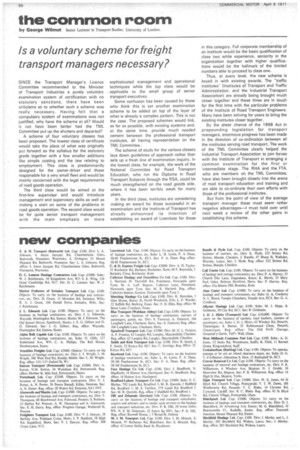Is a voluntary scheme for freight transport managers necessary?
Page 88

If you've noticed an error in this article please click here to report it so we can fix it.
SINCE the Transport Manager's Licence Committee recommended to the Minister of Transport Industries a purely voluntary examination system of certification with no statutory sanctions, there have been criticisms as to whether such a scheme was really necessary. Having felt that a compulsory system of examinations was not justified, why have the scheme at all? Would it not have been better had the TML Committee put up the shutters and departed?
A scheme of four voluntary classes has been proposed. The lowest class of certificate would take the place of what was originally put forward as the syllabus for the statutory grade together with a few smaller additions like simple costing and the law relating to employment. This class is predominantly designed for the owner-driver and those responsible for a very small fleet and would be mainly concerned with the legal requirements of road goods operation.
The third class would be aimed at the first-line supervisor and would introduce management and supervisory skills as well as making a start on some of the problems in road goods operation. The second class would be for quite senior transport management with the main emphasis on more sophisticated management and operational techniques while the top class would be applicable to the small group of senior transport executives.
Some confusion has been caused by those who think this is yet another examination scheme to be added on top of the layer of what is already a complex pattern. This is not the case. The proposed schemes would link, as far as possible, with existing systems and, at the same time, provide much needed cement between the professional transport -institutes, all having representation on the TML Committee.
The scheme of study for the various classes lays down guidelines of approach rather than sets up a fresh line of examination inquiry. In the lowest class, for example, the work of the National Committee for Road Transport Education, who run the Diploma in Road Transport Subjects through the RSA, could be much strengthened on the road goods side, where it has been terribly weak for many years.
In the third class, institutes are considering making an award for those successful in an examination and the Institute of Transport has already announced its intention of establishing an award of Licentiate for those in this category. Full corporate membership of an institute would be the basic qualification of class two while experience, seniority in the organization together with higher qualifications would be the hallmark of the limited numbers able to proceed to class one.
Thus, at every level, the new scheme is keyed in with existing awards. The "traffic institutes" (Institutes of Transport and Traffic Administration, and the Industrial Transport Association) are already being brought much closer together and these three are in touch for the first time with the particular problems of the Institute of Road Transport Engineers. Many have been striving for years to bring the existing institutes closer together.
By the sheer chance of the 1968 Act in propounding legislation for transport managers, enormous progress has been made in the direction of co-ordination between all the institutes serving road transport. The work of the TML Committee clearly helped the Industrial Transport Association to join forces with the Institute of Transport in arranging a common examination for the first or intermediate stage. The RHA and the FTA, who are members on the TML Committee, have also been brought closely into the arena of road transport education and training and are able to co-ordinate their own efforts with those of the professional institutes.
But from the point of view of the average transport manager these must seem rather negative advantages-I must hold over until next week a review of the other gains in establishing this scheme.




































































































































